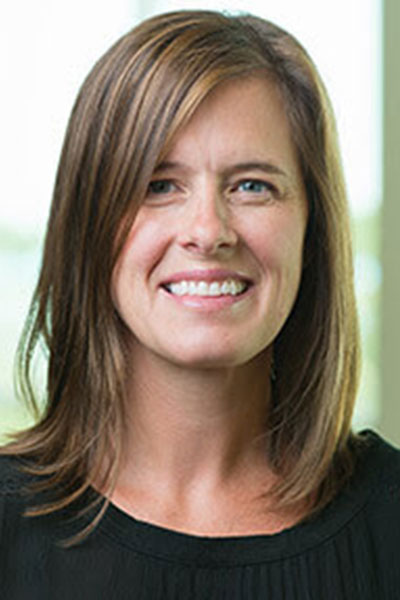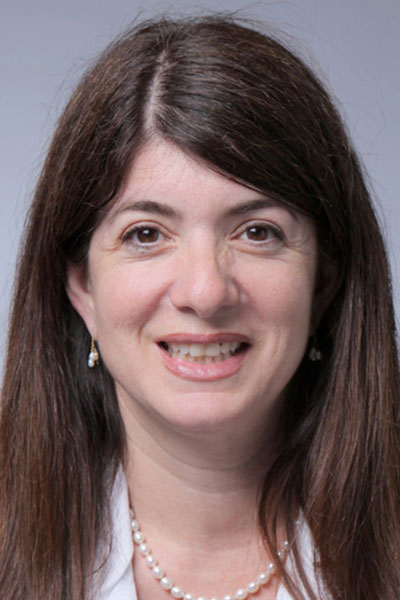Irreversible airway dilation and bronchial wall thickening have been increasing in prevalence worldwide, prompting the ATS to collaborate with colleagues at the American College of Chest Physicians (CHEST) for a Joint Session on Bronchiectasis. The scientific symposium will be held on Sunday, May 21, from noon–1 p.m. ET in Room A-B (Level 2) of the Walter E. Washington Convention Center.

In the U.S., among individuals 65 and older, bronchiectasis cases increased more than 8 percent per year in the first decade of the 2000s, said session Chair Shannon Kasperbauer, MD, infectious disease physician and associate professor of medicine, Division of Mycobacterial and Respiratory Infections, National Jewish Health.
It is a tricky disease to diagnose, and many patients do not receive a definitive diagnosis until years after the onset of symptoms.
“It really does require a CAT scan to diagnose bronchiectasis,” Dr. Kasperbauer said. “Patients’ most common complaint is the chronic cough, and that is such an ambiguous symptom. It could be representative of so many different pulmonary diseases that many of our patients are misidentified as having COPD or asthma or chronic bronchitis, when in fact they have this other phenomenon called bronchiectasis, which has different strategies of management.”
Pamela J. McShane, MD, The University of Texas Health Science Center at Tyler, will discuss the dynamics of evaluating this chronic disease.

“We are figuring out more ways to find underlying etiologies in these patients,” said session Co-Chair and CHEST President Doreen J. Addrizzo-Harris, MD, professor at the NYU Grossman School of Medicine and co-director of the NYULH Bronchiectasis and NTM Program, Division of Pulmonary, Critical Care and Sleep Medicine. “They’re not all idiopathic, so learning the advances and the newest areas to try and figure out the etiology is going to be important.”
James Chalmers, MBChB, PhD, The Scottish Centre for Respiratory Research, Dundee, United Kingdom, will detail bronchiectasis phenotypes.
“Phenotyping is something new to this area. Are your patients predominantly neutrophilic? Are they predominantly eosinophilic?” Dr. Addrizzo-Harris asked. “We never used to think about that before, and that’s going to be extremely important in deciding which anti-inflammatory therapies a patient might be a candidate for.”
Charles L. Daley, MD, National Jewish Health, will discuss therapeutics in bronchiectasis, including the results of A Study to Assess the Efficacy, Safety, and Tolerability of Brensocatib in Participants With Non-Cystic Fibrosis Bronchiectasis (ASPEN), now in phase three. There are no approved drugs for bronchiectasis, but ASPEN phase two demonstrated that brensocatib, a drug that targets neutrophils in the airways, could significantly decrease bronchiectasis exacerbations.
“In the past, we were mostly focused on targeting the bacteria that were causing the exacerbations, and now there has been a new focus on targeting the white blood cells and some of the serine proteases that are byproducts from the white blood cell,” Dr. Addrizzo-Harris said.
People living with bronchiectasis are particularly vulnerable to infections, including bronchitis and pneumonia. Patients with exacerbations then go on to develop chronic infections with organisms that ultimately become drug resistant, making these individuals harder to treat, Dr. Kasperbauer noted.
Marcos I. Restrepo, MD, MSc, PhD, University of Texas Health Science Center at San Antonio, will discuss the management of drug-resistant organisms.
“There’s such a nice overlap of basic science and clinical work that’s going to be presented. Both sides of the spectrum are going to be presenting evidence, from the early investigator to lead investigators, and research for clinicians and nurses,” Dr. Kasperbauer said. “We are employing more physician outreach teams in bronchiectasis programs and clinics, so I think it’s going to have a wide audience.”
The session also will be presented at the CHEST 2023 conference.
“It’s so important to collaborate with all of our expertise in different international societies,” Dr. Kasperbauer said. “It’s only going to improve our educational outreach and collaborative studies.”
REGISTER FOR ATS 2024
Register today for the ATS 2024 International Conference! Don’t miss this opportunity to take part in the in-person conference, May 17-22 in San Diego. Join your colleagues to learn about the latest developments in pulmonary, critical care, and sleep medicine.
Not an ATS member? Join today and save up to $540.
